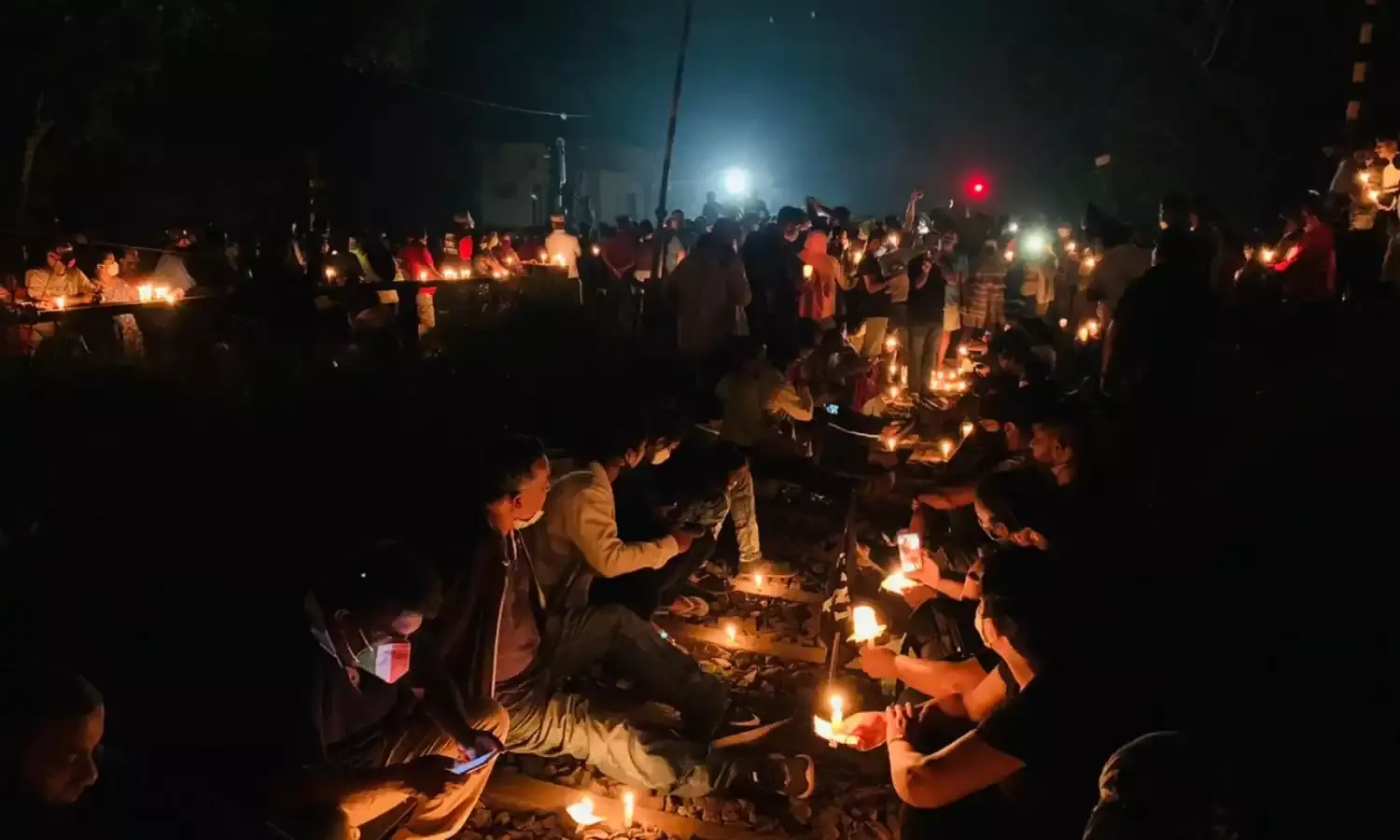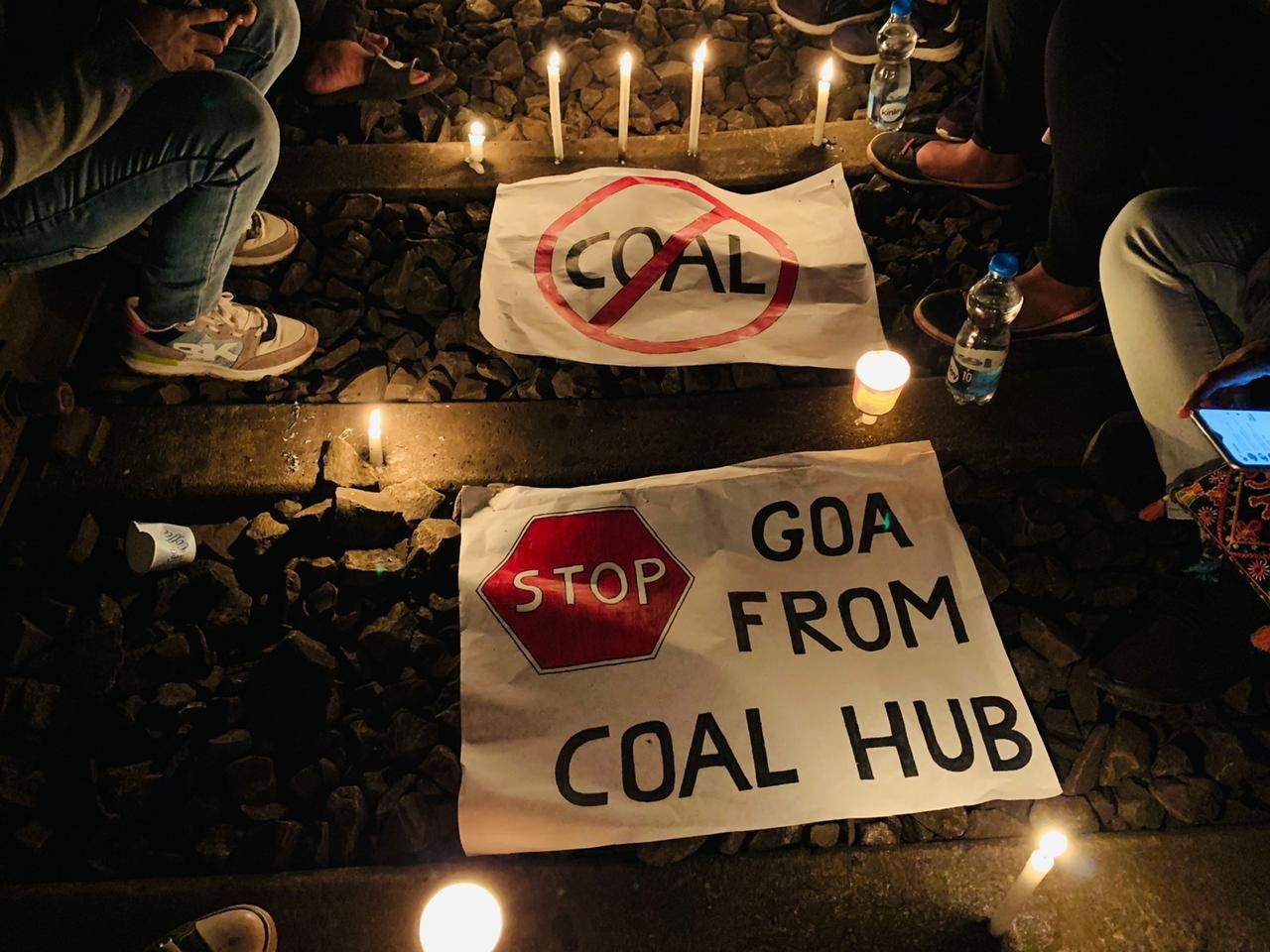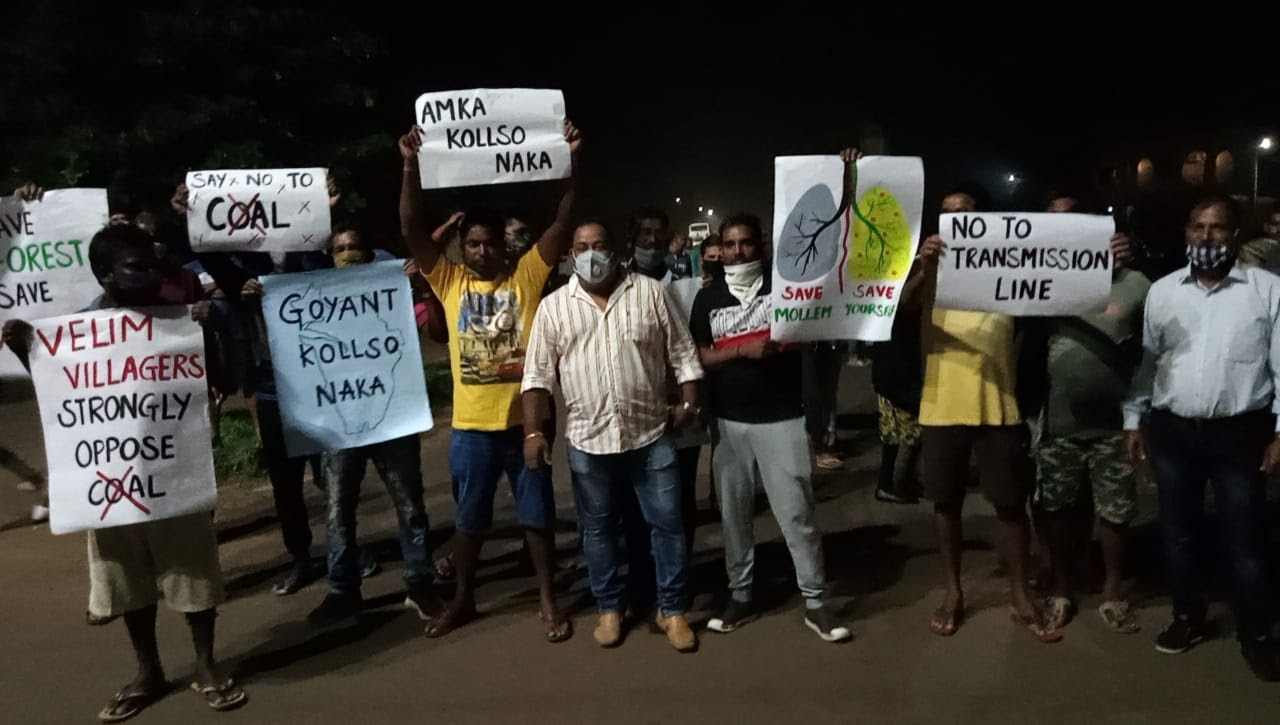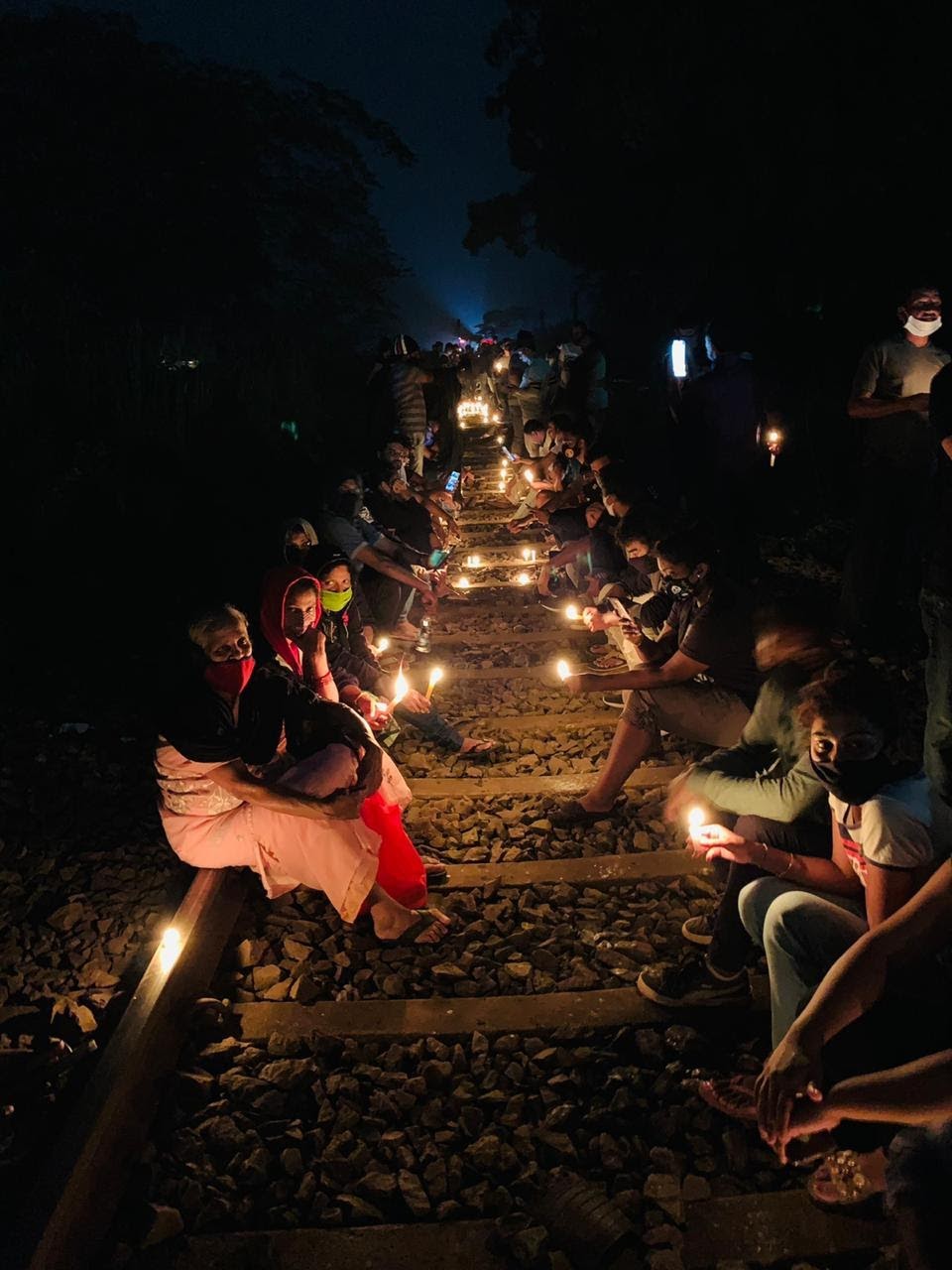'Goa Not A Coal Hub': Protestors Block Railway Track in Midnight Protests
Oppose Railway Expansion

On the night of November 1, thousands of people gathered at the railway track in Chandor, South Goa to protest the South Western Railways’ double-tracking project, reportedly being carried out to transport coal from the state to steel plants in north Karnataka. Demonstrators alleged that the project would make Goa a coal transportation hub, posing a threat to livelihoods and the state’s ecological diversity—all while favouring big coal companies.
Under the banner Goyant Kollso Naka (We don’t want coal in Goa), a large number of protestors held an all-night vigil at Chandor from midnight to 5 am on November 2, leading candlelight marches, raising slogans to the beat of drums and blockading the railway line where double-tracking work was scheduled to begin.
Creson Antao, convenor of Goencho Ekvott—an umbrella organisation that is part of the movement against the railway double-tracking—stated that the protestors handed over a memorandum to the Deputy Collector at the protest site, demanding that the order permitting the expansion work to be withdrawn.
“We have submitted a written application to the Deputy Collector to revoke the NoC given to the railways to do the work... We have given them a deadline. We handed over the memorandum early morning… and said by tomorrow the Collector has to give us an appointment to take our views,” Antao said.
He told The Citizen that South Goa Collector, Ajit Roy, gave the order to temporarily close level crossing roads for five hours (from midnight to 5 am) on three days at three locations—October 28 at Nessai, November 2 at Chandor and November 9 at Davorlim—permitting the developer Rail Vikas Nigam Limited (RVNL) to cut roads in order to lay the double tracks. While on October 28, a few villagers had gathered in protest at Nessai, they were unable to stop the work from going ahead, Antao said.
Meanwhile, he claimed that the Railway did not have all the permissions required to carry on the work as “the panchayat had not given any license to do so.” Without the local governing body’s approval, Antao alleged that the track work is “illegal”.
“Work is in progress, even though all the permissions are yet to be granted. The Union Ministry of Environment, Forest and Climate Change’s (MoEFCC) guidelines stipulate that for linear projects, the construction work should not begin until all the permissions have been granted,” Hindustan Times quoted Abhijit Prabhudesai of Goyant Kollso Naka as stating.

Picture credit: Save Mollem Campaign
On the intervening night of November 1-2, “Our supporters turned up in huge numbers and it was a massive crowd,” Antao said. Save Mollem Campaign, a citizen’s movement to raise awareness about Mollem National Park and the threats posed by the three infrastructural development projects, tweeted that the coal trains that ply on these tracks in the dead of night were not allowed to pass by the protesting crowd.
According to reports, representatives of various political parties, including Congress, the Goa Forward Party (GFP) and the Aam Aadmi Party (AAP) also participated in the protest.
PTI quoted leader of Opposition in Goa Legislative Assembly, Digambar Kamat, alleging that the state government was planning to convert Goa into a coal hub. He claimed that the double-tracking of the railway line is being done to help coal-handling companies transport coal from Mormugao Port Trust to their steel plants in neighbouring Karnataka.
According to a Times of India report, the umbrella organisation, Goyant Kollso Naka has also condemned the state government “for refusing to listen to the genuine demands of the people of Goa to stop the double tracking works, which are purely for the transportation of coal from Goa.”
“Despite numerous requests from all sections of the society and the overwhelming decision of Goans to stop coal transportation through Goa, the government is arrogantly continuing to work for the profits of Adani, Jindal and Vedanta, ignoring the reasoned and irrefutable arguments of the people of Goa,” reported TOI.
The double-tracking project is one of three linear infrastructure projects planned in the state that have witnessed massive opposition from citizens and environmental groups alike, for posing a threat to the forests and biodiversity in and around Bhagwan Mahaveer Wildlife Sanctuary and Mollem National Park. The proposed project will pass through the national park—one of Goa’s largest protected areas. The other two projects include laying a 400 KV power transmission line and a four-lane highway expansion.
Antao explained that apart from the grave ecological destruction that will be caused by this project, it will also destabilise the tourism industry—the mainstay of Goan economy.
“After mining, our major industry which people are directly and indirectly involved in, is tourism. So, if you allow coal in Goa, the tourism industry will collapse. The people will be directly affected because lakhs of people are dependent on tourism,” he said.
The adverse impacts of the project would extend to the fishing industry and agriculture as well. Coal dust, which can travel to distances of 5-15 kilometres, depending on wind and train speed, will negatively affect farming, Antao told The Citizen.
Together, the three proposed projects will cause irreparable damage to the Western Ghats, one of the 36 global biodiversity hotspots and a UNESCO World Heritage Site.

Picture credit: Save Mollem Campaign

Picture credit: Save Mollem Campaign
Antao further claimed that all three proposed projects were related to one larger goal—that of pushing coal. “It is all related to one. Because of coal, these three projects are coming in. The Tamnar power line, expansion of highway and double tracking—all three projects are related to one - coal. If you stop coal, then no need to do all these things,” he said.
He told The Citizen that during a meeting of various organisations with Chief Minister Pramod Sawant on October 13, the delegation of 17 representatives had submitted two letters written by erstwhile Chief Minister of Goa, late Manohar Parrikar, in which he opposed proposals for enhancing cargo-handling capacity at Mormugao Port Trust (MPT). Cortalim MLA Alina Saldanha, the only legislator belonging to BJP, the ruling party in the state, who has opposed the double-tracking project, cited Parrikar’s refusal to give permission for laying double tracks. Parrikar even called the project an “MPT fraud”.
“Because he (CM Sawant) said when he became CM that he will move in the footsteps of late Mr. Manohar Parrikar, so we have first given him the letters,” Antao stated.
Meanwhile, Goa Power Minister Nilesh Cabral has said that the movement against coal is “politically motivated”. "There is no intention of the government to increase the coal-handling capacity. The rail double-tracking is required to run more trains. It has nothing to do with coal- handling," he is reported to have said.
While the November 2 citizens’ vigil at the railway tracks has received widespread media attention, sustained protests against the projects have been ongoing, even during the pandemic. From affected villagers demonstrating on-ground to a widespread online movement led by students and activists that attempts to create awareness among the public, petition local MLAs to raise these issues in assembly and harness the power of art and social media to spread the word—the citizens’ resistance has been strong.
Cover Photo: Save Mollem Campaign



